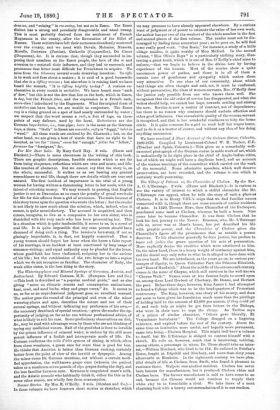The Village of Palaces or, the Chronicles of Chelsea. By
the Rev. A. G. L'Estrange. 2 vols. (Hurst and Blackett.)—It is curious to see the variety of interest to which a skilful chronicler like Mr. L'Estrange can appeal, when he tells the story of such a place as Chelsea. It is in Henry VIII.'s reign that we find familiar names connected with it, though there are some records of earlier residents of note. In 1520, Thomas More, then Chancellor of the Exchequer, purchased some land at Chelsea, whereon he built a home. Nine years later ho became Chancellor. It was from Chelsea that he took his last journey to the Tower. Erasmus, who, Mr. L'Estrange tells us, never was at Moro's house, has yet described his life with graphic power, and the Chronicles of Chelsea gives the Chancellor's figure all the prominence that so notable a person deserves. To his character generally he does justice, but prefers to leave sub judice the grave question of his acts of persecution. More explicitly denies the cruelties which were attributed to him. On the other hand, there is a heavy weight of testimony against him, and the denial may only refer to what he is alleged to have done with his own hand. We are introduced, as the years go on, to various per- sonages of dignity, to Queen Catharine Parr, the Princess Elizabeth, and "Bess of Hardwick." About the middle of the seventeenth century comes in the name of Cheyne, which still survives in the well-known
" Cheyise Walk." Names more or less famous begin to crowd upon us, among them Lord Herbert of Cherbury, Dr. Donne, and Herbert the poet. Before these days, however, King James I. had attempted to found a College which was to be the head-quarters of Protestant controversy. The King, however, was chary of his money, and does not seem to have given his foundation much more than the privilege
of holding land to the amount of £3,000 per annum, if they could get it, and such help as might be got from letters to the Bishops,
who were in their tarn to urge the clergy. As Tacitus says of a prince of similar character, "Others gave liberally, Et Vespa.sianus hortabatur." The College dragged on a lingering existence, and expired before the end of the century. About the same time an institution more useful, and happily more permanent, came into being,—Chelsea Hospital. This might well have a volume to itself, but Mr. L'Estrange is obliged to content himself with a sketch. He tells us, however, much that is interesting, noticing, among others, a personage in whom Dr. Thom should take an inter- est,—William Hireland, who lived to be 112. He enlisted in Fairfax's Horse, fought at Edgehill and Newbury, and more than sixty years afterwards at Blenheim. In the eighteenth century we have plen- tiful details of life at Chelsea, from Swift, who found it pleasant to rusticate there. Walpole was another resident. Chelsea has never been famous for manufactures, but it produced Chelsea china and Chelsea buns. The former manufacture is said to have come to an end, because the Chinese would not continue to supply their white clay to so formidable a rival. We take leave of a most charming book with a hearty recommendation of it to our readers.


































 Previous page
Previous page